The Lilith Blog
August 8, 2018 by Kira Yates
Five Things You Can Do Right Now for Abortion Rights
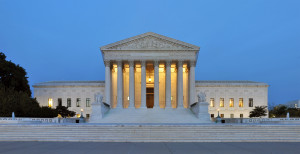 In the 45 years since Roe v. Wade was decided in 1973, feminists have worried that abortion rights are gradually being eroded as some states passed laws limiting aspects of this medical procedure. After the announcement of Donald Trump’s Supreme Court nominee, Brett Kavanaugh, the first thought in the minds of many is the future of hard-won reproductive rights. Now, the right to determine one’s own reproductive future, once guaranteed by Roe, may hang by a thread.
In the 45 years since Roe v. Wade was decided in 1973, feminists have worried that abortion rights are gradually being eroded as some states passed laws limiting aspects of this medical procedure. After the announcement of Donald Trump’s Supreme Court nominee, Brett Kavanaugh, the first thought in the minds of many is the future of hard-won reproductive rights. Now, the right to determine one’s own reproductive future, once guaranteed by Roe, may hang by a thread.
- No Comments
August 7, 2018 by Helene Meyers
When an Accused Sexual Harasser is an Academic Superstar
The news report that Steven M. Cohen, a luminary in Jewish sociology, is an alleged serial sexual harasser sickened me. New York Jewish Week broke this story that brought the #metoo movement to the heart of Jewish Studies. Cohen is currently a professor at Hebrew Union College, Jewish Institute of Religion in New York and has just voluntarily resigned his position as the director of the Berman Jewish Policy Archive at Stanford University; his work on contemporary Jews is widely known and supported not only by prestigious academic institutions but also by well-regarded Jewish communal networks.
Cohen’s sexual misconduct has apparently been part of his professional modus operandi for decades. He has not denied the multiple charges against him, which include touching women’s breasts in public, propositioning mentees for sex, and using sociological research as a screen for homophobic conduct.
- 1 Comment
August 2, 2018 by admin
What the Lilith Staff is Reading Now
Welcome to another installment of this occasional recurring feature in which Lilith staffers reveal what books are on our nightstands, our e-readers and tucked in our bags for the commute. Share your own summer reads in the comments!
Kira Yates, Intern:
This summer I’ve decided to read two books at once: The Guide for the Perplexed by the Rambam himself, Rabbi Moshe ben Maimon, and The Heart is a Lonely Hunter by Carson McCullers. Though one was written in 1190 Spain and the other in 1940s Georgia, the theological treatise and the novel explore God and the actions of human kind. In his investigation of Jewish philosophy, ben Maimon seeks to prove that God does not have a body–an assertion that became a scholarly sensation across Europe. McCullers, on the other hand, tells the story of four struggling people in a small Georgia town, a reminder of what it feels like to be forgotten and in search of human connection. Published 750 years apart, these books present parallels about the human need for understanding and unity with something greater than the self.
- No Comments
August 1, 2018 by Dorrit Corwin
A Wordless Bar Mitzvah That Was Far From Silent
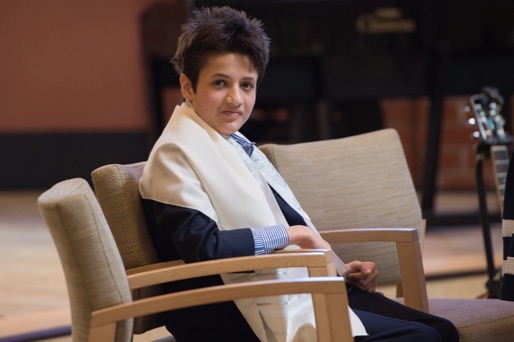
This article was originally published on Jewish Women, Amplified, the blog of the Jewish Women’s Archive, and was written as part of the Rising Voices Fellowship.
Over the years, I’ve been to countless bar and bat mitzvah ceremonies. While each one has been unique to the specific teen being honored, all of the services have catered to the typical Jewish kid: one who can read English and some Hebrew, memorize prayers, and stand at the bimah and speak about his or her Jewish education and life experiences. In February, I had the honor of being part of a bar mitzvah that was unlike any of the others I had previously attended. My family friend Max became a bar mitzvah without speaking a single word.
- 1 Comment
August 1, 2018 by Sarah M. Seltzer
More Summer Page-Turners and Pleasure Reads
The world is in a pretty dark spot right now, and books–whether heartbreaking or quirky or incandescent—are a rare opportunity to step away from the chaos and enlighten yourself at the same time. So we at Lilith think it’s okay—nay, great—to lose yourself in a summer story that gives you pleasure while you turn its pages.
So in addition to Chanel Dubofksy’s picks from last week, here are a few more 2018 books, ranging from slight to serious, that should give Jewish feminist readers (and indeed, all readers) something to curl up with as the summer hits its sultry stride.
- No Comments
July 31, 2018 by Penny Jackson
I Couldn’t Divorce My Mother-in-Law
 The Lilith blog presents original short fiction: “The Elephant in the Bush” by Penny Jackson
The Lilith blog presents original short fiction: “The Elephant in the Bush” by Penny Jackson
“Look,” my mother-in-law tells me. “There’s an elephant in the bushes.”
I turn to look where she is pointing. We are sitting on white deck chairs in a very suburban backyard in New Jersey.
“Do you see it?” She presses my hand. My mother-in-law, whose name is Ida, starts bobbing her head in the agitated way I know now so well.
“Of course,” I tell her, taking off my sunglasses and peering at the shrubbery.
“How funny. Not only an elephant. But a baby elephant!”
Ida is in stage five of Alzheimer’s disease. She is either a late five or early six. I’ve read the books her daughter has loaned me. The 36-Hour Day is the most popular book that is passed around from family member to family member.
- 1 Comment
July 27, 2018 by Chanel Dubofsky
Five Books We’re Loving This Summer
The dog days of summer are here, but there’s still plenty of time to stretch out with a good book. Here is a glimpse of what we’re reading this August — look for part two coming soon!
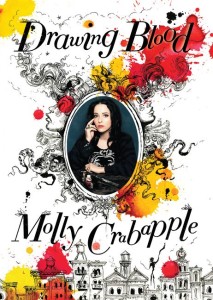 Drawing Blood, Molly Crabapple (Harper Collins, 2017)
Drawing Blood, Molly Crabapple (Harper Collins, 2017)
If you’re not familiar with Molly Crabapple, you should remedy that immediately, starting with her memoir. Drawing Blood begins with her childhood in New York City, and follows her as she draws her way through art school, traveling in Europe, Morocco, Marrakech, modeling with Suicide Girls, and witnessing, through illustration, Occupy Wall Street, Syria, on Rikers’ Island, and in Guantanamo Bay (the book opens with Crabapple sketching the trial of 9.11 mastermind Khalid Sheikh Mohammed). Crabapple hasn’t just made a book about becoming an artist, but how art creates a revolution inside oneself, and in the whole world.
- No Comments
July 26, 2018 by Yona Zeldis McDonough
An Ode to Iris Apfel
At age 84, Iris Apfel had the distinction of being the first living person whose clothing was exhibited by the Metropolitan Museum of Art’s renowned Costume Institute. Ever since I stumbled upon the show Rara Avis: Selections from the Iris Apfel Collection at the Met in 2005, I became an ardent fan of Apfel. Walking through the galleries, I was captivated by her highly original way of mixing high-low fashion, as well as her knack for building an outfit with the depth, complexity and wit of an accomplished visual artist.
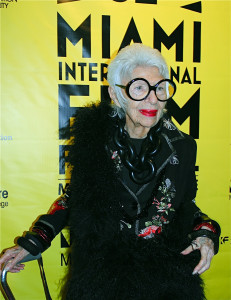 I bought the accompanying book and kept Apfel on my radar—and so did the media. There were the various sightings and snapshots by the late Bill Cunningham, a 2015 Emmy-nominated documentary by the late Albert Maysles, a costume jewelry line sold on the Home Shopping Network and a partnership with MAC Cosmetics. But it was the most recent addition to the Apfel canon, Iris Apfel: Accidental Icon—Musings of a Geriatric Starlet (HarperDesign) that made me understand her place in the tapestry (pun intended!) of Jewish history.
I bought the accompanying book and kept Apfel on my radar—and so did the media. There were the various sightings and snapshots by the late Bill Cunningham, a 2015 Emmy-nominated documentary by the late Albert Maysles, a costume jewelry line sold on the Home Shopping Network and a partnership with MAC Cosmetics. But it was the most recent addition to the Apfel canon, Iris Apfel: Accidental Icon—Musings of a Geriatric Starlet (HarperDesign) that made me understand her place in the tapestry (pun intended!) of Jewish history.
- No Comments
July 20, 2018 by Eleanor J. Bader
Marilyn Sneiderman on Finding Optimism and a Life of Labor Organizing
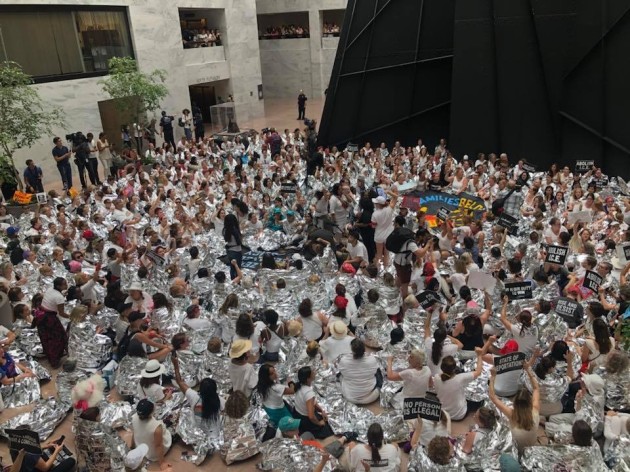
“You have to be an eternal optimist to be a community and labor organizer,” Marilyn Sneiderman, Executive Director of the Center for Innovation in Worker Organization, says with a laugh. “You have to believe social change and social justice are not just some distant hope, but are something we can win through our day- to-day organizing and vision of a more just world.”
Sneiderman spoke to Eleanor J. Bader several days after she was arrested—along with more than 600 women from throughout the country—at a sit-in at the Hart Senate Office Building in Washington, DC. The action was called to protest the family separation and incarceration policies of US Immigration and Customs Enforcement (ICE).
- No Comments
July 18, 2018 by Talia Lang
Ten Inspiring Quotes to Get You Through Dark Days
In today’s world of constant crisis, self-care pays dividends. Here are 10 quotes from Jewish women whom we love that should give you hope, inspire you to action, and spur us all to think differently about compassion.
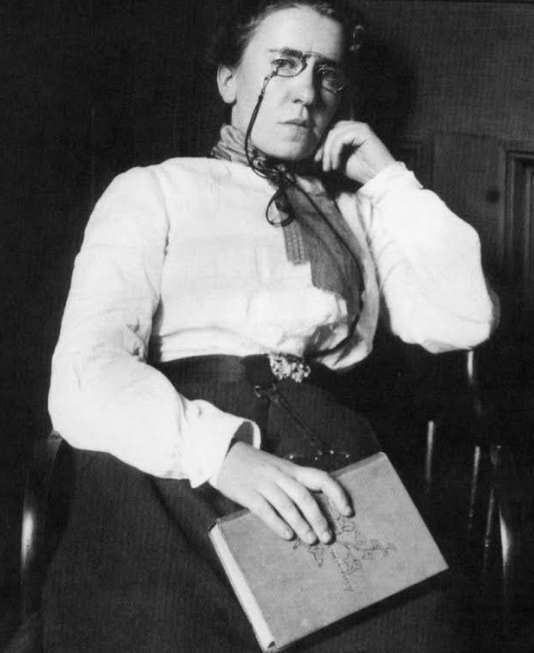 “The history of progress is written in the blood of men and women who have dared to espouse an unpopular cause, as, for instance, the black man’s right to his body, or woman’s right to her soul.” – Emma Goldman
“The history of progress is written in the blood of men and women who have dared to espouse an unpopular cause, as, for instance, the black man’s right to his body, or woman’s right to her soul.” – Emma Goldman
- No Comments
 Please wait...
Please wait...